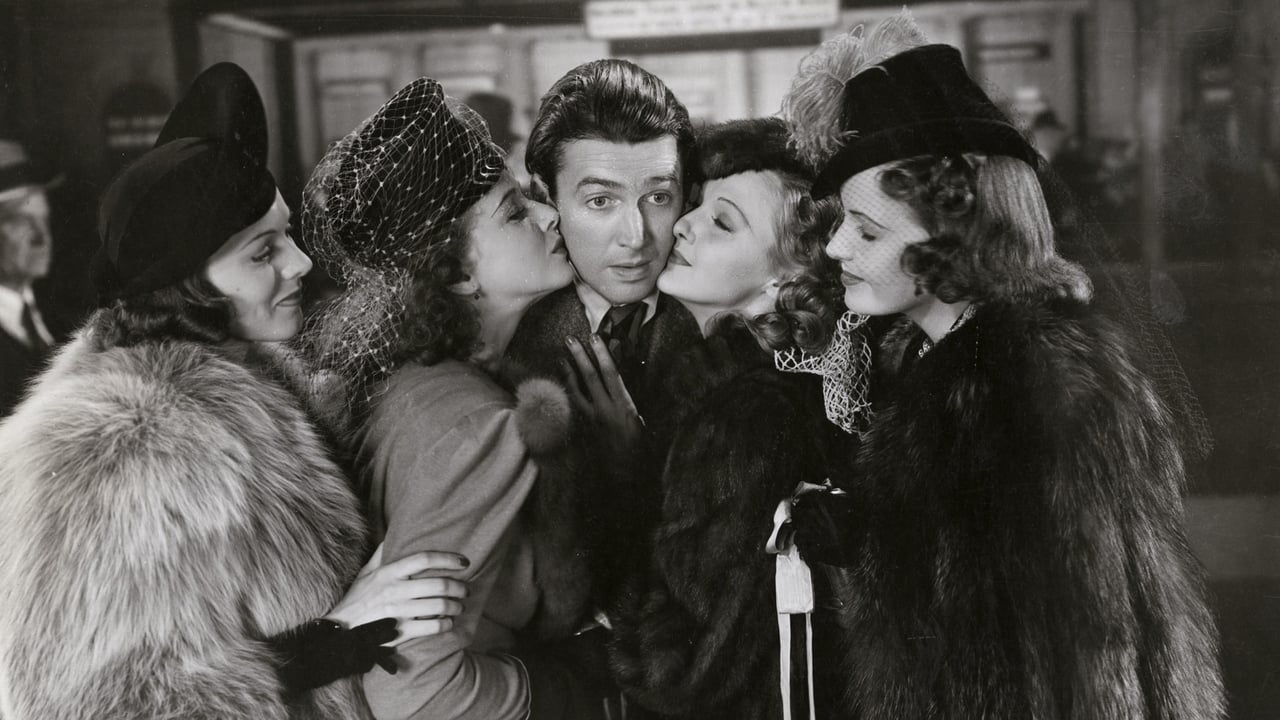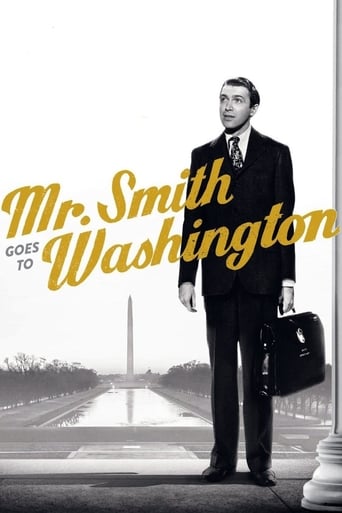Linbeymusol
Wonderful character development!
SpuffyWeb
Sadly Over-hyped
Marketic
It's no definitive masterpiece but it's damn close.
Lela
The tone of this movie is interesting -- the stakes are both dramatic and high, but it's balanced with a lot of fun, tongue and cheek dialogue.
Ivan Lalic
Americans are the nation of pathetic patriotism, but not rarely mixed up with some more or less strong criticism of their own system and the greed it is based on. When you combine all those elements together, you get a story about a small man's struggle against the system and money called "Mr Smith goes to Washington".
James Stewart is one of those actors who can carry this kind of role with ease, creating the sympathy of an average viewer, while the story remains everlasting, despite some rather naive and pathetic outcomes and subplots.
"Mr Smith goes to Washington" was a classic movie for the entire family and still pretty much is just that.
Anssi Vartiainen
A senator suddenly dies and a replacement needs to be named. The other senator for the state, Joseph Paine (Claude Rains), along with Jim Taylor (Edward Arnold), his corrupt businessman backer, decide to name a truly surprising candidate, one Jefferson Smith (James Stewart). He's meant to be nothing more than a seat warmer so that Paine and Taylor can push through a new piece of legislation concerning a dam, meant to make them filthy rich. Unfortunately Mr. Smith is something they've rarely seen and are utterly incapable of understanding: a good and honest man. And a boy scout to boot.The film is corny and filled with pathos. Phrases like "the American dream", "truth and honesty", "reliability", and so many like those, get thrown around all the time. Politicians are nothing more than hungry jackal fat cats, aiming to filch the hard-earned pennies of the good American people. True way of life is to be found outside, on the prairies where grass leans on the wind. On the mountains reflected against the noon sun. I could feel my spleen turning red, white and blue as I watched this film.And yet, despite all that, the film is magnificent. Perhaps it's because 'It's a Wonderful Life', another film from director Frank Capra, also stars Stewart, but for some reason or other this film reminds me of Christmas. Because Christmas is also corny and filled with pathos. It is. But it's also the best time of the year. When it's okay to be a bit sentimental. Or a lot sentimental. When it's okay to remind ourselves of the values we all hold dear, but which we usually don't talk about because it's seen as embarrassing.Hopefully people still watch this film. Because even though it's old, and corny, and sentimental, and even a bit silly, it's values, themes and lessons are as relevant today as they were back then. Perhaps even more so.
mark.waltz
For a film 88 years old and 14 presidents later, this film represents what is best about the United States and also a reminder what is wrong with it. I do find it difficult to pick out the best film out of the dozens of classics released in 1939, but of those 50 or 60, "Mr. Smith" remains the most prestigious with a message that resonates today. Like the dozens of classics in 1939, this has dozens of moments that are considered among the great scenes in film history. As good as best actor winner Robert Donat was as "Mr. Chips", James Stewart is simply far better, going from naive country bumpkin handed a senate seat, his slow education to the corruption, his determination to accomplish something, the crooked obstacles he faces, and the explosion that opens his eyes to the evils standing in his way. Stewart displays many different sides to his character, but one thing is clear: he isn't going to fall down and go boom without fighting. This features an ensemble that rivals 1939's best picture winner, "Gone With the Wind", starting with Jean Arthur as his initially cynical assistant, Claude Rains as his long time mentor, Edward Arnold as the power hungry money man (identical to his powerful Nazi like autocrat in "Meet John Doe", Guy Kibbee as the governor of Stewart's home state, and Beulah Bondi (in a role she would play many times) as Stewart's mother. Ruth Donnelly as Kibbee's no nonsense wife, Charles Lane as a nosy reporter and Thomas Mitchell as Arthur's confidante are also quite good. The surprise for me is Harry Carey as the speaker of the house who says more with a bang of his gavel and all knowing grin than the rest of the cast does with Robert Riskin's brilliant words. Director Frank Capra has been nicknamed the inventor of "Capra Corn", a description of the stories of Cinderella men who rose above their naivete to fight injustice. Rains is described as a villain in this, but he's a villain with a soul, one who forgot why he got into public service in the first place, allowing himself to be manipulated and controlled at the expense of his soul. Stewart's desire to have a boy's camp funded blocks pending bills of Rains and several others, and this results in some violently shocking actions, culminating in the famous filibuster sequence.I believe in fighting for lost causes, so this film means a lot for me. This film means more to me now than it did upon my first viewing of it some 30 years ago. Memories of a family trip to Washington D.C. when I was a boy and a return for a march for a supposed lost cause make the big eyed grins of the young pages and visiting boy scouts all the more emotional. Seeing this film in a chaotic time makes it all the more memorable, and even with simple, supposedly dated, American values, shows that modern values are as corrupt as the most sinister of political bigwigs that control the government behind the scenes.
elvircorhodzic
The film is based on an unpublished story. This is another Capra's "gentleman" who travels to the big city. Mr. SMITH GOES TO WASHINGTON is the affirmation of idealism ordinary "small" man, benevolent and noble individuals whose actions can and manages to change the world. Director's style is excellent. Mr. Deeds has already won the audience. Mr. Smith is another part of similar stories and themes. Coincidentally, "man of the people" becomes essential. By chance he comes in the opportunity to learn about the disease of society and to a painful, romantic, compelling and always humor bathed in a way defending real human values. Comedy upgraded socio - political ideological segments. American society, like any other is perishable. It is unlikely that this one little man can change. The culmination of this film returns us faith in the true value.James Stewart (Jefferson "Jeff" Smith) is idealistic and honest man who will soon disappoint the world of high politics. Fantastic performance was launched in the stars. His performance was fantastic.Jean Arthur (Clarissa Saunders) is quiet in search of human warmth. The search for something that would change her monotonous everyday life is at times accompanied by sarcasm. I must admit that I really like her acting. Her experience is growing in the climax of the film. It is again a "trigger" of the main character.The story is a playful and dynamic, perhaps a little more symbolic. The picture is excellent. The dialogues in the troubles are good. Romance is definitely late, but the intimate moments of the main characters are very well designed. It's a strange feeling. Almost all my works great, and I'm still not satisfied. Certainly this movie will not be called controversial. Honesty, love and kindness in times of corruption.

